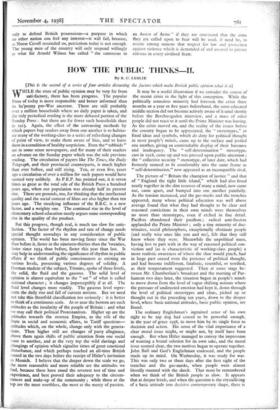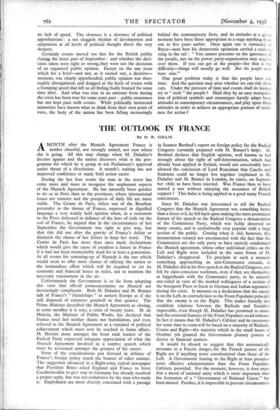HOW THE PUBLIC THINKS—IL
By S. C. LESLIE
[This is the second of a series of four articles discussing the factors which make British public opinion what it is] WHILE the state of public opinion may be very far from satisfactory, there has been progress. The popular Press of today is more responsible and better informed than its ha'penny pre-War ancestor. There are still probably over a million households where no daily paper is taken, and the only periodical reading is the more debased portion of the Sunday Press : but there are far fewer such households than in 1913. Again, the effect of the canvassing methods by which papers buy readers away from one another is to habitu- ate many of the working-class to a series of refreshing changes of point of view, to make them aware of bias, and to leave them in a condition of healthy scepticism. Even the " tabloids " are in some sense newspapers, and for many of their readers an advance on the Sunday paper which was the sole previous reading. The circulation of papers like The Times, the Daily Telegraph, and their provincial counterparts, is much higher than ever before, and still rising. Ten, or even five, years ago a circulation of over a million for such papers would have seemed very unlikely. As P.E.P. has pointed out, it is seven times as great as the total sale of the British Press a hundred years ago, when our population was already half its present size. There are grounds, too, for thinking that the intellectual quality and.the social content of films are also higher than ten years ago. The steadying influence of the B.B.C. is a new factor, and a weighty one. The continual rise in the level of elementary school education surely argues some corresponding rise in the quality of the product.
But this progress, though real, is much too slow for satis- faction. The factor of the rhythm and rate of change needs special thought nowadays in any consideration of public opinion. The world has been moving faster since the War than before it, faster in the nineteen-thirties than the 'twenties, faster since 1934 than before, faster this year than last. It may help in understanding the significance of rhythm in public affairs if we think of public consciousness as existing on various levels, possessing various degrees of solidity. A German student of the subject, Tonnies, spoke of three levels, the solid, the fluid and the gaseous. The solid level of opinion is almost equivalent to the " set " of what is called national character ; it changes trnperceptibly if at all. The fluid level changes more readily. The gaseous level repre- sents the daily rise and fall of current notions. But we need not take this threefold classification too seriously : it is better to think of a continuous scale. At or near the bottom are such attitudes as the insularity of the people of Britain : and what we may call their political Protestantism. Higher up are the attitudes towards the oversea Empire, to the role of the State in social and economic affairs, to Tariff questions— attitudes which, on the whole, Chang only with the genera- tions. Then higher still are changes of party allegiance, above them again shifts of public attention from one social issue to another, and at the very top the wild darlings and plungings of opinion which signalise times of great emotional disturbance, and which perhaps reached an all-time British record in the two days before the receipt of Hitler's invitation to Munich. I believe that the .deeper down the scale we go, the more reasonable and more reliable are the attitudes we find, because these have stood the severest test of time and experience, and best proved their adequacy to the circum- stances and make-up of the community ; while those at the top are the most worthless, the most at the mercy of passion. It may be a useful illustration if we consider the course of the recent crisis in the light of this conception. While the politically conscious minority had foreseen the crisis three months or a year or five years beforehand, the semi-educated middle section did not become actively aware of it until shortly before the Berchtesgaden interview, and a mass of other people did not react to it until the Prime Minister was leaving. As the crisis moved on, and the reality of the issues before the country began to be appreciated, the " stereotypes," or fixed ideas and symbols, which do duty for political thought in most people's minds, came up to the surface and jostled one another, giving an unmistakable display of their bareness and inadequacy. The " self-determination " stereotype, cast in 1918, came up and was pressed upon public attention ; the " collective security " stereotype, of later date, which had formerly seemed to fit comfortably into the same frame as " self-determination," now appeared as an incompatible rival; The picture of " Britain the champion of justice " and that of " England the tight little island," which had also fitted neatly together in the dim recesses of many a mind, now came out, came apart, and bumped into one another painfully. As the tension increased, and the gas-masks and the trenches appeared, many whose political education was well above average found that what they had thought to be clear and reasoned convictions in their own minds were themselves no more than stereotypes, even if etched in fine detail. Pacifists abandoned their pacifism ; radical anti-fascists applauded the Prime Minister ; only a tiny minority of doc- trinaires, social philosophers, exceptionally obstinate people (and really wise ones like you and me), felt that they still knew where they were. Meanwhile the unpolitical mass, having less to part with in the way of reasoned political con- viction and (as is characteristic of working-class people) a more realistic awareness of where the shoe would pinch, had in large part ceased even the pretence of political thought, and had become indifferent, fatalistic, resentful, or terrified, as their temperament suggested. Then at some stage be- tween Mr. Chamberlain's broadcast and the meeting of Par- liament two days later, the situation began in people's minds to move down from the level of vague shifting notions where the pressure of undirected emotion had kept it, down through the level of political stereotypes and ideas, picked up or thought out in the preceding ten years, down to the deeper level, where basic national attitudes, basic public opinion, are found.
The ordinary Englishman's ingrained sense of his own right to be top dog had ceased to be powerful enough, in the year of grace 1938, to move him by its single force to decision and action. His sense of the vital importance of a dear moral issue might, or might not, by itself have been enough. But when Hitler managed to convey the impression of wanting a brutal solution for its own sake, and the moral issue seemed clear, the two motives began to operate together. John Bull and God's Englishman coalesced, and the people made up its mind. On Wednesday, it was ready for war. This was only two or three days after the first sight of the trenches and the gas-masks, when people were almost literally stunned with the shock. That must be remembered when we think of the British people as slow. It appears that at deeper levels, and when the question is the crystallising of a basic attitude into decisive contemporary shape, there is no lack of speed. The slowness is a slowness of political apprehension : a too sluggish rhythm of development and adaptation at all levels of political thought above the very deepest.
Certainly events moved too fast for the British public during the latter part of September : and whether the deci- sions taken were right or wrong, they were not the decisions of an organised public opinion. Except on the one issue which for a brief—and not, as it turned out, a decisive— moment, was clearly apprehended, public opinion was thor- oughly disorganised, and dragged at the heels of events with a bumping speed that left us all feeling badly bruised for some time after. And what was true in an extreme form during the crisis has been true for some years past : public awareness has not kept pace with events. While politically instructed minorities have known what to think from their own point of view, the body of the nation has been falling increasingly behind the contemporary facts, and its attitudes at a given moment have been those appropriate to a stage anything from one to five years earlier. Once again one is reminded of Bryce—note how his democratic optimism carried a realistic sting in the tail : " You cannot presume on the ignorance of the people, nor on the power party-organisation may acquire over them. If you can get at the people—for that is the difficulty—things will usually go well. But the people »not have time."
One great problem today is that the people have nut time. And the question may arise whether we can risk short cuts. Under the pressure of time and events shall its leaders try to " rush " the people ? Shall they by an easy manipula- tion of political symbols and stereotypes hastily adapt basic attitudes to contemporary circumstances, and play upon those attitudes in order to achieve an appropriate posture of readi- ness for action ?











































 Previous page
Previous page